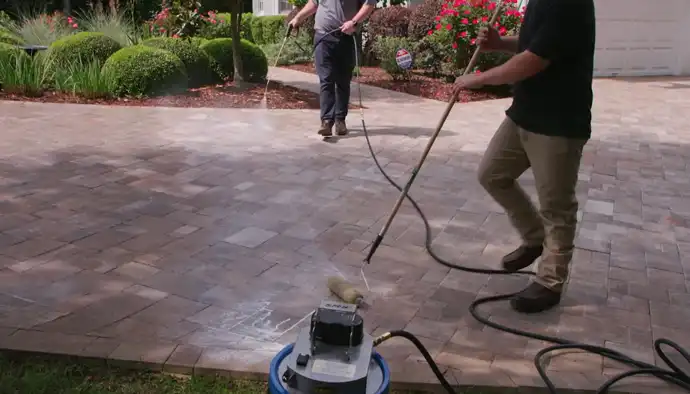Last Updated on June 20, 2023
A sealer is an invisible barrier that sits on top of your pavers and protects them from the elements. Over time, sealers will wear away and need to be reapplied.
However, the benefits of using a paver sealer are numerous and well worth the effort of reapplication.
But with all the different sealers on the market, how do you know which one is best for your needs? Here’s a quick overview of the most popular types of sealers available and their benefits.
Need A Quick Decision? Just Follow This Table
4 Reasons to Use a Paver Sealer on Your Concrete Pavers
Here are four reasons you should consider using a paver sealer on your concrete pavers:
Protection from the Elements
Pavers are subject to a lot of wear and tear due to their exposure to the elements. sun, rain, snow, and ice can all cause damage to pavers over time.
A paver sealer protects pavers from this damage by creating an invisible barrier between the pavers and the elements.
Easy Maintenance
Once you’ve applied a paver sealer, maintaining your pavers is a breeze. All you’ll need to do is sweep them regularly and hose them down as needed.
You won’t have to worry about sanding or repainting them as they’ll already be protected from the elements.
Enhanced Beauty
A paver sealer will also enhance the beauty of your pavers by giving them a glossy finish. This glossy finish will make your pavers look new for years to come and will protect them from dirt, grime, and other build-up that can make them look dull over time.
Increased Longevity
Finally, using a paver sealer will increase the longevity of your pavers. By protecting them from the elements and making them easy to maintain, you’ll be able to enjoy your pavers for years to come without having to replace them as often.
Our Top 10 Best Sealer for Concrete Pavers Reviews by an Expert
Factors to Consider When Getting the Best Sealer for Concrete Pavers
A good sealer will protect your pavers from staining, fading, and general wear and tear. There are a lot of different sealers on the market, so how do you know which one is right for you?
Here are a few factors to consider when making your decision:
Type of Paver
The first thing you need to consider is the type of paver you have. Different types of pavers require different types of sealers.
For example, if you have clay pavers, you’ll need a sealer that won’t darken or discolor them. On the other hand, if you have concrete pavers, you’ll want a sealer that will enhance their color.
Usage
How do you plan on using your pavers? If they’re going to be in an area that gets a lot of foot traffic,you’ll want a durable sealer that can withstand a lot of wear and tear.
However, if they’re going to be in an area that doesn’t get much use, you can probably get away with a less durable (and less expensive) sealer.
Budget
Of course, one of the most important factors to consider is your budget. Fortunately, there are sealers available at all different price points, so you should be able to find one that fits within your budget.
Just be sure not to sacrifice quality for price a cheap sealer now could end up costing you more in the long run if it has to be replaced sooner than a higher-quality (but more expensive) one.
What are the benefits of sealing concrete pavers?
When it comes to concrete pavers, there are a lot of benefits to sealing them. Not only does it protect the pavers from staining and fading, but it also makes them easier to clean and maintain.
Here, we’ll be discussing the top 5 benefits of sealing concrete pavers. Keep reading to learn more!
Sealing protects concrete pavers from staining and fading
One of the biggest benefits of sealing concrete pavers is that it helps to protect them from staining and fading. The sealer creates a barrier between the pavers and any liquids or materials that could potentially stain them.
This is especially important if you have light-colored pavers, as they are more susceptible to staining.
Sealing makes concrete pavers easier to clean and maintain
Sealed concrete pavers are also much easier to clean and maintain than unsealed pavers. You won’t have to worry about your pavers absorbing any spills or dirt, as the sealer will repel it.
This means that you can just hose off your pavers with some water when they start to look dirty – no need for harsh cleaners or scrubbing!
Sealing extends the life of concrete pavers
Another great benefit of sealing concrete pavers is that it helps to extend their lifespan. The sealer creates a tough surface that is resistant to wear and tear, meaning that your pavers will last longer before they need to be replaced.
Sealing enhances the color of concrete pavers
Sealed concrete pavers also tend to have a richer, more vibrant color than unsealed pavers. This is because the sealer helps to bring out the natural colors in the paverstones. If you’re looking forpaVERS that will really pop, then sealing is a must!
Sealing protects concrete Pavers from damage caused by freeze-thaw cycles
If you live in an area with freezing winters, then sealing your concrete Pavers is a must in order to protect them from damage caused by freeze-thaw cycles.
When water seeps into the pores of unsealed Pavers and freezes, it expands and can cause the Pavers to crack or chip. However, sealed Pavers are much more resistant to this type of damage as the sealer prevents water from seeping into the pores of the stone.
Are there any drawbacks to sealing concrete pavers?
Sealing concrete pavers can actually have a few drawbacks.
First, it can be expensive, and it’s not always necessary.
Second, it can trap moisture beneath the pavers, leading to efflorescence (a white powder that forms on the surface of masonry).
Third, if not done properly, it can poor adhesion between the sealant and the paver surface, which may lead to peeling or flaking.
Finally, sealants are typically made from petrochemicals, so they may not be environmentally friendly.
How often should you seal concrete pavers?
It is generally recommended to seal concrete pavers every two to three years. Depending on the climate and other environmental factors, it might be necessary to seal them more or less often.
Sealing the pavers helps protect them from staining and fading, and also helps keep them looking new for longer.
How do you know when it’s time to seal your concrete pavers?
As a general rule, it’s best to seal pavers shortly after they are installed. Sealing pavers sooner rather than later will help protect them from staining and fading.
If you’re not sure if your pavers need sealing, you can test them by pouring a little water on top. If the water beads up and doesn’t soak in, then they don’t need sealing yet.
If the water soaks in, then they do need sealing and you should seal them as soon as possible.
To Sum Things Up
Sealing your concrete pavers is important in order to protect them from stains, fading, and weather damage. Paver sealers offer numerous benefits that make them well worth the effort of reapplication every few years.
They protect pavers from the elements, make them easy to maintain, enhance their beauty, and increase their longevity.
So if you’re looking for a way to extend the life of your concrete pavers, be sure to use a paver sealer!



